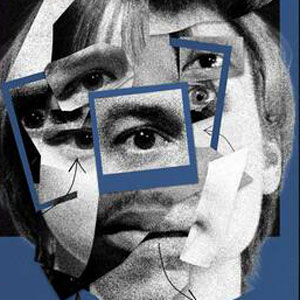
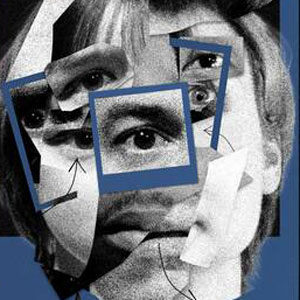 [rating=3] It’s not that unusual for people to make minor adjustments to their faces that are a bit more intensive than normal grooming and make-up. Often it’s to look like themselves at a different age, or serves a medical purpose. But if something happened that required your entire face to be rebuilt from scratch, and you could make it look any way you wanted, what would you pick? Would it bother you to pick from a standard offering that other people might choose? These are questions raised in the 2007 play The Ugly One by German playwright Marius von Mayenburg, now being performed in an English adaptation by Maja Zade at Trap Door Theatre. Under the direction of Michael Mejia, the play has a zany energy and comedy ranging from cringe to goofy, but serves to prompt bigger questions.
[rating=3] It’s not that unusual for people to make minor adjustments to their faces that are a bit more intensive than normal grooming and make-up. Often it’s to look like themselves at a different age, or serves a medical purpose. But if something happened that required your entire face to be rebuilt from scratch, and you could make it look any way you wanted, what would you pick? Would it bother you to pick from a standard offering that other people might choose? These are questions raised in the 2007 play The Ugly One by German playwright Marius von Mayenburg, now being performed in an English adaptation by Maja Zade at Trap Door Theatre. Under the direction of Michael Mejia, the play has a zany energy and comedy ranging from cringe to goofy, but serves to prompt bigger questions.
Lette (Dennis Bisto), a developer of new hardware parts, was not aware that there was anything wrong with his face. He is happily married and well-established in his career. But when he is informed that his underling will be presenting his product at a conference in his place, he indignantly demands to know why. “Your face is unacceptable,” comes the reply. It can’t sell the product and is likely to make people hostile to it. Lette’s wife, Fanny (Juliet Huneke), reluctantly tells him that this is true, and Lette realizes that in all the time they’ve been married, she has always avoided looking at him. The plastic surgeon, Scheffler (Alexis DawTyne), says she has never seen a challenge like this and she will have to completely reconstruct everything to make him tolerable. But, miraculously, the experimental procedure works. Lette’s new face brings instant success and completely upends his life and all his relationships. The man nobody respected has become the man people can’t get enough of. But now that Scheffler knows how to make the perfect face and offers it to all who pay, is it actually his?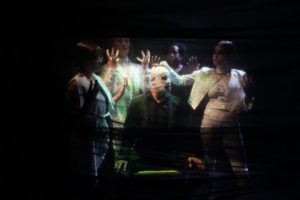
To get this out of the way: there is nothing wrong with Dennis Bisto’s face. Much of the show’s absurd humor comes from how Lette’s face doesn’t change at all after the surgery in any way that the audience can perceive. But what does throw off the audience’s perception is that not only are several roles double-cast, but that different characters share the same name. Scheffler is not only the name of the innovating plastic surgeon, but of Lette’s ruthless boss (David Lovejoy). Karlman is the name of Lette’s suffering underling (played by Matty Robinson), but is also the name of the smothered son of one of his business prospects (the prospect is played by Juliet Huneke, the son by David Lovejoy). The use and limits of individual identity are a major theme of the play, and even before the characters develop the ability to literally share the same face, they are constantly having to defend their value against competitors for the same relationships. Lette’s boss phrases this explicitly in terms of monetary value, but after his enhancement, Lette informs his wife that she must up her game if she wants to maintain sexual or romantic access to a man other people desire.
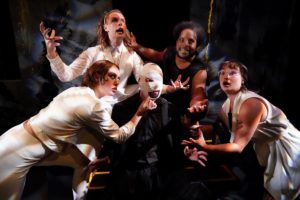
Director Michael Mejia’s cast is plenty high in energy, in service to the grotesque way in which their characters are presented and distinguished. (There’s not much risk of getting the different characters played by the same actors confused when they appear, only when they are spoken about.) In this reviewer’s opinion, Zade’s translation pops with wit and the whole cast has excellent comedic timing and physicality. The design is relatively subtle for Trap Door, the play being absurdist instead of surreal, but set designer J. Michael Griggs locates us in a factory to drive home the point about manufactured identity. The Ugly One isn’t all that story-centric a play, for all its twists and turns, but is more of an avenue for exploring a concept. As I watched it, my imagination turned to the digital necromancy that hardly existed in 2007, but has become common in franchise movies. Although it doesn’t rely a lot on technical illusions, the play is also distinctly theatrical—The Ugly One wouldn’t work in any other medium without significant changes. For all its dark tones, it’s a fun romp and a very contemporary satire.
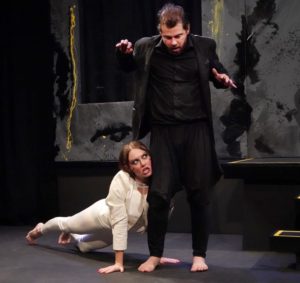 The Ugly One will continue at Trap Door Theatre, 1655 W Cortland Ave, Chicago, thru October 29, at the following times:
The Ugly One will continue at Trap Door Theatre, 1655 W Cortland Ave, Chicago, thru October 29, at the following times:
Thursdays: 8:00 pm
Fridays: 8:00 pm
Saturdays: 8:00 pm
Running time is seventy-five minutes with no intermission.
Tickets are $25 with 2 for 1 admission on Thursdays. Visit Trap Door Theatre or call 773-384-0494 or email boxofficetrapdoor@gmail.com
To see what others are saying, go to Theatre in Chicago and click “The Ugly One.”






More Stories
“The Firebugs” reviewed by Julia W. Rath
“The Book of Grace” Al Bresloff with another from Paul LIsnek
“The Last Five Years” MILWAUKEE